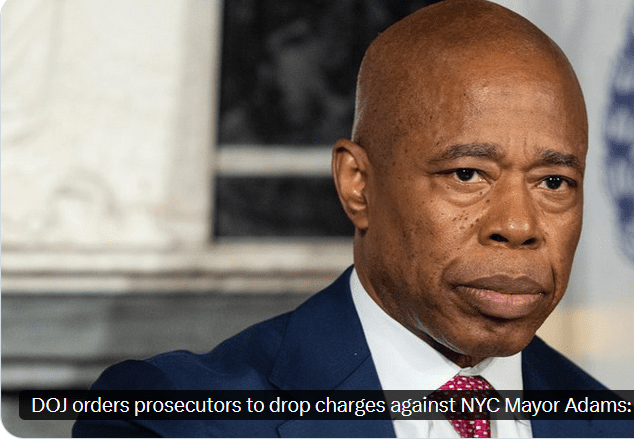In a dramatic turn of events that could be a plot from a political thriller, the corruption case against New York City’s Mayor Eric Adams (X account) has become the center of a national controversy. In September 2024, Mayor Adams was indicted on charges including bribery, fraud, and soliciting illegal foreign campaign donations, marking him as the first sitting mayor of New York City in modern history to face such allegations.
The case, initially spearheaded by the Southern District of New York under President Joe Biden’s administration, took a sharp turn when the new administration, led by President Donald Trump, issued an order to dismiss these charges.
Current Situation:
The U.S. Department of Justice (DOJ), under the guidance of acting Deputy Attorney General Emil Bove, a known Trump appointee, directed federal prosecutors to drop the charges against Adams, citing his role in addressing immigration policies as a reason for this unprecedented move.
This directive led to a wave of resignations, with seven top prosecutors, including Danielle Sassoon, the acting U.S. Attorney for the Southern District of New York, stepping down rather than comply with what they perceived as political interference in legal proceedings. The resignations have sparked a crisis within the DOJ, highlighting a deep conflict between legal ethics and political directives.
Summary of Discussion on X:
On X, the narrative is polarized. Some posts reflect a mix of skepticism and outrage. Some users suggest this move by the DOJ is a clear sign of political manipulation, where legal actions are tailored to fit political agendas. Others see it as an attempt by the Trump administration to secure support from influential Democrats like Adams, particularly for controversial policies like immigration enforcement. However, there are also numerous users who state that the charges against Adams were already a political hoax.
The online discourse is rife with accusations of a “Saturday Night Massacre” level of political overreach, drawing parallels to historical instances where justice was subverted for political gain.
Hypothesis:
The sequence of events suggests a hypothesis that this case might be an example of political malversation. The timing and nature of the DOJ’s order to drop the charges could indicate a quid pro quo arrangement where Adams’ legal troubles are alleviated in exchange for his support on immigration policies—a key issue for Trump’s administration. The mass resignations of prosecutors, who have publicly decried this order as politically motivated, lend credence to the notion that legal integrity is being compromised for political expediency.
Is This Political Malversation or Pragmatic Politics?
- Political Malversation: The resignations, the public statements from the resigned prosecutors, and the rapid, seemingly politically motivated dismissal of charges against Adams point towards a manipulation of legal processes for political ends. This scenario raises concerns about the health of democracy when legal accountability seems to bend to political will.
- Pragmatic Approach: On the flip side, one could argue that dismissing the charges against Adams might be a strategic move to ensure the city’s leadership can focus on pressing issues without the distraction of legal battles. Perhaps, from a pragmatic standpoint, having a mayor free to govern during a time of crisis (like managing migrant influx) outweighs the need for immediate legal accountability.
Conclusion:
The unfolding drama around Mayor Adams’ legal situation questions the very principles of justice, governance, and political integrity in the United States. Whether this is a case of political malversation or a calculated move for pragmatic governance remains a contentious debate. The public, the media, and the political class are left to ponder: Should legal accountability ever be sacrificed at the altar of political strategy? This case will undoubtedly be scrutinized for years to come, serving as a litmus test for the balance between law and politics in American democracy.





